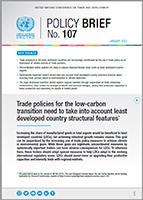
Increasing the share of manufactured goods in total exports would be beneficial to least developed countries (LDCs), but achieving industrial growth remains elusive.
This goal can be jeopardized by the increasing use of trade policy measures to achieve climate or environmental goals.
While these goals are legitimate, uncoordinated measures by systemically important traders can have adverse consequences for LDCs.
To attenuate them, these traders should adopt special measures to help LDCs adapt to the evolving international regulatory scene. LDCs should invest more on upgrading their productive capacities and intensify trade with regional markets.
Key points:
- Trade prospects of the least developed countries are increasingly conditioned by the use of trade policy as an instrument of climate policies of trade.
- Uncoordinated carbon policies are likely to impose disproportionate trade costs on least developed country.
- Systemically important traders should take into account least developed country structural features when enacting trade policies aimed at environmental or climate.
- The least developed countries should explore regional markets through cooperation on trade-enhancing infrastructure, value chains for strategic products, and business linkages, raising their productive capacities to boost production and improving the quality of traded goods.
This policy brief is based on the contents of UNCTAD (2022), The Least Developed Countries Report: The Low-Carbon Transition and Its Daunting Implications for Structural Transformation.


